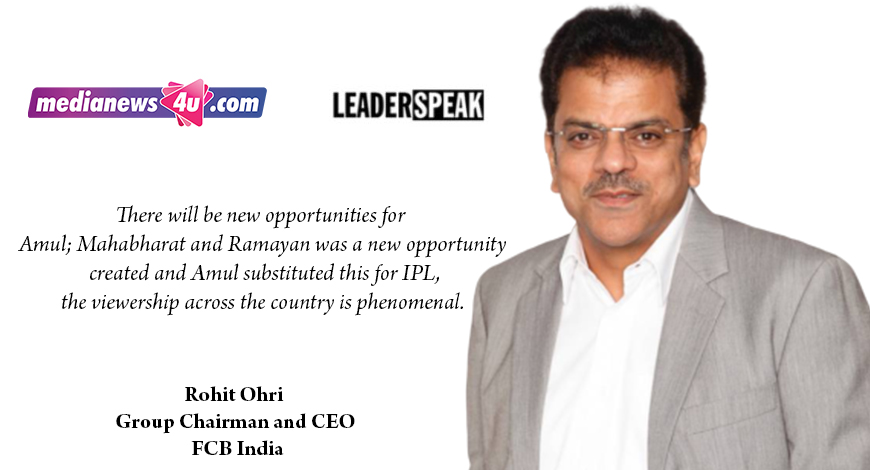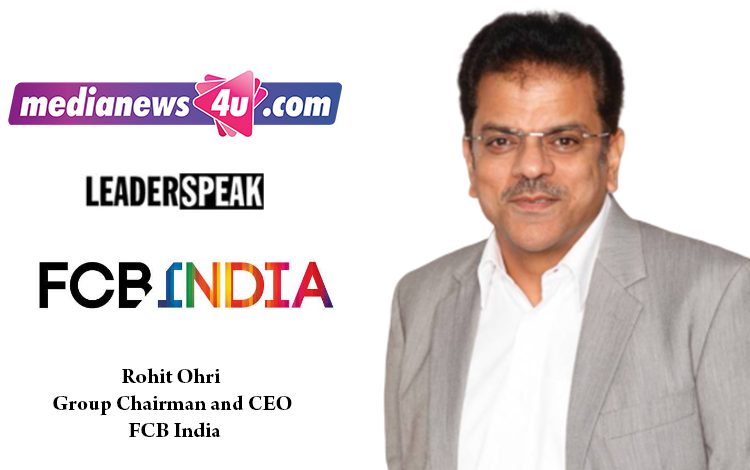It has been exactly a month since the country went into lockdown mode due to the pandemic. We are hoping that the lockdown will be lifted on the 3rd of May. It seems unlikely. The recent outbreak of the COVID – 19 is also seeing a tectonic shift in most people’s lives. There are so much stress and anxiety about job losses, loneliness, and other factors. But this lockdown has also changed the way organizations are thinking, the way they work, etc.
MediaNews4U spoke to Rohit Ohri – Group Chairman and CEO, FCB India
It’s been nearly a month since the lockdown, how are you coping and boosting the morale of your team?
One of the big things actually the lockdown has done, that it has been quite an eye-opener, the way the agencies adapted to and I hear that from many other agencies as well. The agencies that have adapted to work from home and the fact that work is happening, meetings are happening and there is enough volume of work that is keeping everybody busy. The interesting thing is that we had actually locked down about a week before the lockdown was announced by the Prime Minister, what that actually did was it helped us to fine-tune the technology. Everybody was properly trained on Microsoft Teams, Zoom and we set up a unit and a 24/7 helpline for it. We moved all the machines to people’s homes, we organized Wi-Fi, high speed for them, and other facilities. Once the technology aspect of it was done, we enabled all our people to work from home.
The second big part of course, the uncertainty of it, which has created a lot of anxiety among people as every day we are reading so much of negative news, the global sentiment and all are nervous about what is really going to happen and what is the future, is the organization stable, can it pass through this storm? So those are the questions that all have, what I do every week now, is I am doing town halls with all 700 employees, they log on and they listen to, interaction is shared as to what we have been doing as a company, what are our future plans. There is a degree of reassurance and I think the most important thing in this phase is communication, you need to over-communicate effectively with people, make sure everyone is engaged, everyone is aligned with what we are trying to do as a company at this point in time. That is very important. We have something called ‘Take Five’, it is a very interesting program where every day you could take five minutes, call five people and ask them about how they are, are they safe, healthy, just talk to them, re-connect with friends, family, clients, etc. The whole thing is that you actually get a reminder every day, it is for you to call either a client, producer, director, some colleagues that you have not worked with for a long time. The existing colleagues today, as we are all in regular touch as everybody is on zoom calls, Microsoft Teams, the idea was to reach out to and make sure that you connect with everyone, it is a great way to promote the culture of the company. Another initiative that we have with HR, there are new things that are lined up every day, an internal mailer is sent to everybody, today at 6 pm there is Tambola. We have now tied up with Mind House the gym for the mind where we do meditation and calming kind of rituals, an initiative to keep the employees mentally healthy. There is entertainment for people and on Friday evening, somebody from the company will come online on Instagram, we are finding talent and people who can sing, music, dance, etc. do a short entertainment clip.
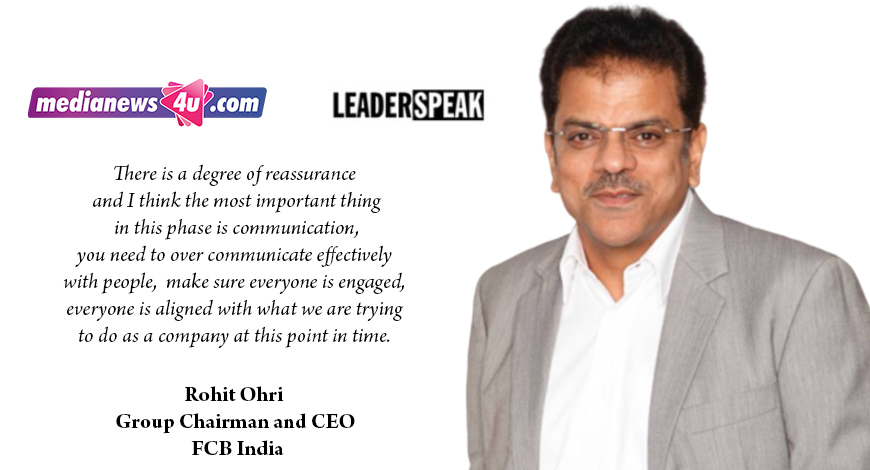
Then the one thing which everyone has really appreciated; at a time when companies are cutting costs, we have actually invested in Doctors 24/7, a platform which gives all our employees access to any doctor for any ailment, specialists, etc. They can just call up the helpline, the helpline will connect them to the doctor, or from the app they can select the doctor, fix an appointment to talk to them. It’s completely done online, almost 250 people have access to this facility and talk to doctors because, at this time, I think people are a little reticent about even going to a hospital.
Then individually groups are doing different things, interesting stuff to keep everyone motivated and together, it is a beautiful culture that is coming through, we are reconnecting more now than before the pre-covid period, as people are caring and concerned about each other. It has been a really great phase to actually see, these little silver linings in this large dark cloud. The thing is that people are no longer just sending messages, the big thing that has happened due to this lockdown is of wanting to see people, and every call is a video call or a WhatsApp call or any of these other platforms. That is definitely come through as one of the big behavior changes that we’re seeing now, whether that is something that will last or revert back to the old ways, one cannot say.
FCB handles some major clients, how are they responding to this period of crisis?
Amul has really come to the service of the nation. What they have managed to do which many, many companies have not managed to pull off is to make sure that everyone has Milk, which is an essential commodity. Amul is the only one because of their huge network and the way they source and deliver milk to the nation and it’s truly ‘ Amul Dhoodh Peeta hai India’, in the period of crisis with the brand standing by the consumer’s side shows there is a special bond that has developed.
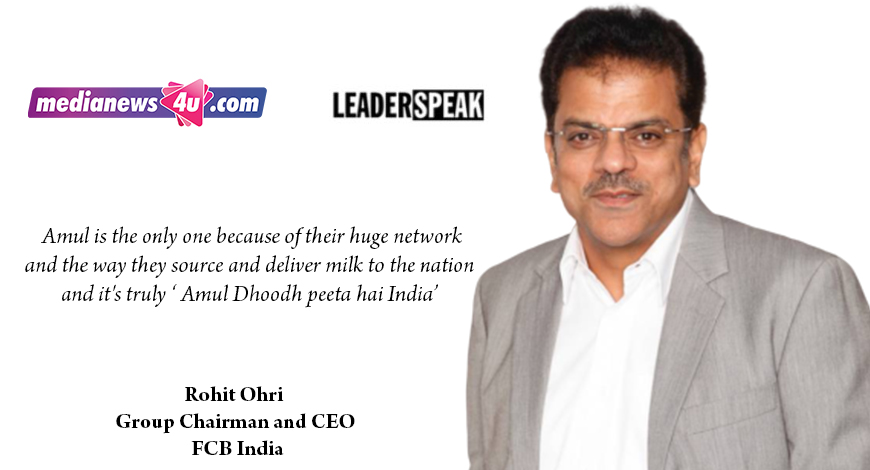
We are telling our clients is, this is a long dark tunnel, we know it is very dark, but we don’t know how long we’re going to be walking through this tunnel. Even when we come out, it is not going to be bright and shiny. That is not going to happen, China and all the other countries are kinds of limping back. So basically what we’re saying is that at the end of the day, brands and clients should not wait for the light at the end of the tunnel, they have to light up the tunnel. This journey that consumers are making through this long tunnel, the brands and clients need to light it up with ideas, innovation, communication, that really create, a special bond, and a special connection. The whole thing of being silent at this point in time is actually the wrong thing for brands to do. But also making noise for the sake of making noise is also not done. What is important is that Brands need to find good, relevant connection and purpose at this point.
All the clients are basically thinking and preparing for recovery and how do we partner with our clients in this road to recovery and I think that is the big thing that we are focusing on presently. We’re doing this research to look at what behavioral changes are going to impact consumers. We have Path to Purchase, which is People and Patent a global tool, Path to Purchase which I think post-COVID will change completely. A COVID version of people in patterns, obviously, there will be a lot more of technology, contactless that is going to come into play. How we maximize that; is really going to be a big thing. I think that the whole partnership with clients is to look at what is the new normal, and how to accelerate our recovery in the new normal. This is the key focus.
What is the strategy for FCB to stay ahead of the curve?
The big thing now is about reinventing and adapting. Over the last month, we have launched two big initiatives. In this phase, I think most of the agencies have gone silent, not much of activity is happening, but what we have done is actually looked at the new normal and these are the two big pressure points that I felt, would stand apart, radio and television will be still strong and will come through strongly. But the experiential will change completely, what is that new experience going to be, that is going to change completely and what is the new retail reality going to be. This is the reason we have partnered with XP & D and Networkbay to actually deliver to the new normal. The research that we are doing will feed into these capabilities, where we will be able to go to clients with the consolidated point of view saying that, in this category, these are the big changes that we’re seeing. This is the behavior that we expect consumers to demonstrate in the new normal and these are the capabilities we have to help you deliver against those challenges.
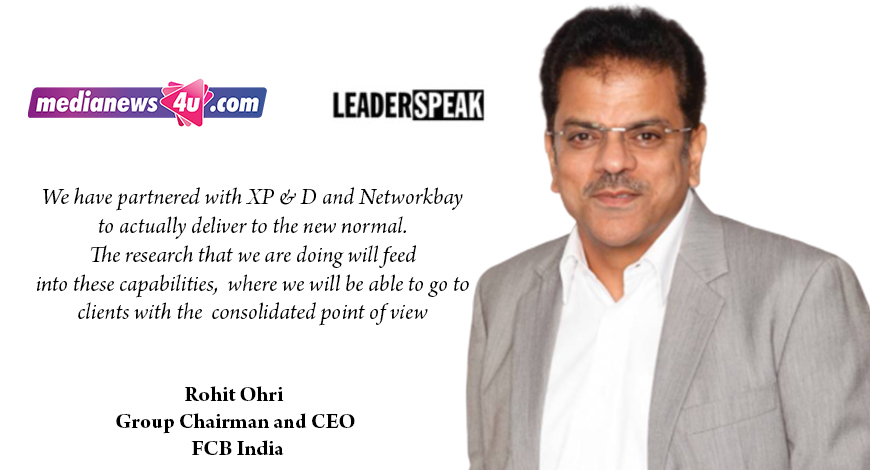
The whole idea is that you have to be nimble and quick and you have to look at it a moving target. Today, if you ask anybody as to what the new normal is going to be people, are not going to be able to tell you exactly, but what we know is that there are certain things where real changes will happen. Many crises have oftentimes left large pockets of the population untouched and they have continued doing what they were doing. This is the first time I think, in the history of humanity, that there has been a crisis that has touched every single person, a hundred countries across the world up and down the socio-economic ladder and the fact is that this has impacted everybody. This will change a lot of behavior across, whether you know this will become 100%, that one is not sure. Yesterday we had a global town hall and our CEO of China went around and shot the recovery of China. The Shanghai office now working but everybody has got their masks, one is not allowed to go out into public space or go to a Mall. Like the seatbelt wearing a mask has become compulsory, people are going to go to work, they do the essential shopping and go back home.
Dominos, we are working with right now to figure out what the reality is going to be, how do you reassure consumers who do not want to order any more? And rightfully so, I mean, you can make a Pizza at home, you feel safer. The whole thing is that, in this, there are a lot of challenges, but the way we are looking at is the opportunity in these challenges and said that let us be nimble, let us be quick, and let us make sure that we can, help clients move into a growth phase as soon as possible.
Globally, we are seeing an economic slowdown. China has reported a 17% fall in revenues. How are you envisaging India’s ADEX growth Post COVID-19?
This is anybody’s guess right now, when we see all these figures floating around, the GDP has been cut to zero, the impact of this is going to be enormous. It all depends on whether we are able to come out of this in a phased and responsible way on the 4th of May, hypothetically, if the lockdown has to continue as some people say till September, then you’re looking at a huge impact on the business and economy. This actually means what Prime Minister Modi said we will go back 21 years, and that will also take India 21 years back. It is a very hard place that we are in, a huge issue and I think economically for us this is a real testing time, companies that can prepare and come out of this enormous crisis would be the organizations that will survive in the future.
When I talk to my global colleagues across the world, across different companies, you really cannot shrink yourself to greatness at this point in time. What will help an agency to come out of this crisis is really the talent that it has? At this point, we cannot randomly cut people, processes, demotivate the system because then you hit the backbone of the organization and the whole superstructure will come crumbling down. The important thing at this time is you have to be very careful, very clear in your messaging and very determined in the steps that you take, very carefully orchestrated, so that you protect what is the most important thing in the company, the core talent, the creativity, you preserve that because if you lose that, then you are building another company from scratch and that does not make sense. I think the important thing at this point in time, is to be clear, to be honest, and transparent with the people, and do the right thing. Very often when you talk about, the best place to work, etc., this is the time when you could demonstrate it. Organizations need to stand up and stand behind the people.
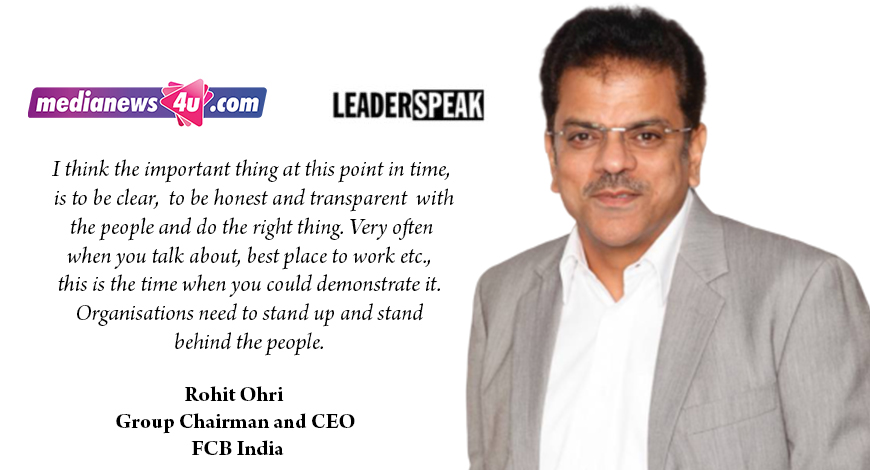
With TV and OTT seeing a huge spike in viewership how are brands strategizing their advertising spends?
OTT is going through the same phase as Paytm and other online payments boomed and saw a sharp increase during DeMonetisation. That was a behavior change towards digital payments. I think what this is going to do to the mobile-first assets, is giving easy accessibility to the consumer to see their own programs at their own space. Earlier the whole family sat together and watching the one single program Mahabharat. Now everyone has the freedom to watch on the mobiles and this new behavior that is going to emerge from this crisis is how the consumers will interact with brands and the media will change.
The shining example of this is print, print is completely down and out at this point because nobody is taking an initiative. Newspapers are not being printed, the ad revenue has plummeted completely. The Print industry has not taken this opportunity to recast their business, for instance, what they are doing now is we all are getting our paper on WhatsApp every day, but is it readable, no, recast the newspaper into a new format, make it easy consumption on a mobile-first platform, then you will have a solution. But what they have done is they have replicated the offline version as the online version. Today the print industry had an opportunity. It would have been great if a digital or an E-paper would have helped the newspaper industry to be relevant at this time. It would have been one of those game-changing behavior changes. Unfortunately, it has not happened.
Advertising on Movies and entertainment was always there. I think what is really happened is what we have seen with Amul when DD decided to bring back Mahabharat, Ramayan, what we did was we brought back all the Amul ads that ran when these two programs were launched, it has been great because people have been reminded of the good days when they were young and growing up, it has been nostalgic and also refreshes the faith and trust in a brand like Amul. This brand has been with us always and refreshes the feeling of bonding and the brand of India. I think it was a very successful use of media at this point in time. Most clients are repurposing their campaigns for television. For many clients who are thinking, that factories are shut and the outlets are shut, what is the point of advertising what is the point of having conventional messaging? Brands have to be very tone sensitive at this point in time and brands need to be very, very careful about their messaging, they do not want to be seen opportunistic. They need to be helpful, they need to be authentic and genuine, but not opportunistic.
What is that one special mantra you want to give to the millennials?
For a lot of the millennials right now, there have been many different messages, good learnings, as I think the important thing here that very early in their life to experience a big crisis like this. This crisis is learning for a lot of us, we are at the end of our careers, you always learn and you grow, but, for the millennials, the important lesson is, they should treat this as a training ground, training for true leadership, and training to understand how to make future organizations. This kind of issues that will arise later, as this is not the end, something else will happen again, the Coronavirus is not going anywhere for a long, long time. We have to live with the Coronavirus and how do we effectively do that is really important.
I think that this is one segment that we will see a lot of behavior changes. One of the initial things that have come out from the research is personal mobility, in the pre-COVID phase, they did not want to buy cars, houses, etc., now suddenly a rethink is happening as now personal mobility is the need of the hour that is the safest thing going forward. So the anxiety is about personnel safety as you do not want to be sitting, in an Uber not touching anything feeling scared. That will be huge behavior change, their behavior change towards wanting stability. They have been there and experimented a lot, now want to look at new things, new ways of working, a great thing at this point in time is to, hunker down and be with organizations and have a steady job,
The third thing, the whole world has realized that it is a great thing to work from home and the millennials want it, this has enabled a lot of organizations including us. I did not think that this WFH would work honestly as we have a strong young population and would adapt to this lifestyle change but the amount of discipline they are showing and the way they are working I am happy to include WFH as a regular feature going forward.
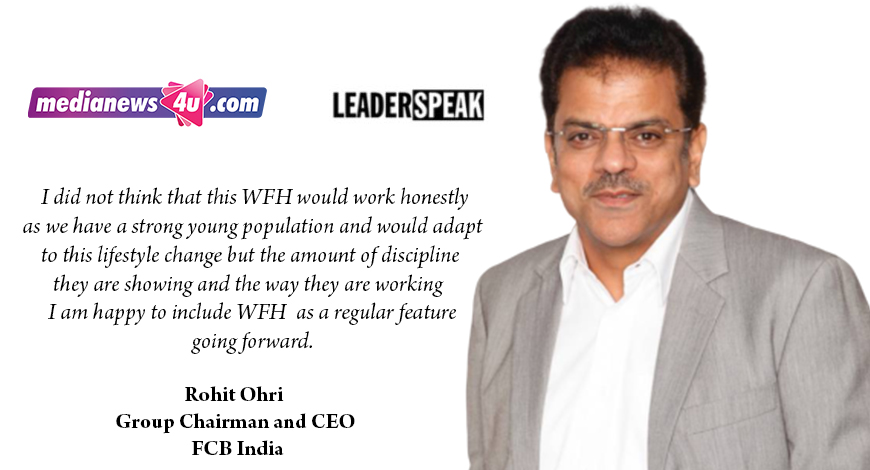
With major events being canceled, especially IPL, how do you see a way forward on this? Will this money on IPL be diverted to other activities and how will the brands be impacted?
There will be new opportunities for Amul; Mahabharat and Ramayan was a new opportunity created and Amul substituted this for IPL, the viewership across the country is phenomenal. It is also the fact that in this crisis people are resorting to religion and remembering God. There are alternative platforms that will come through and opportunities that brands will be adapting to. Media houses are also thinking of and in Q3 & Q4 come up with new platforms for brands to come on board, which is a huge opportunity.
